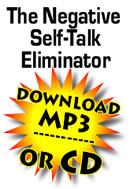Handle It – Dealing with Criticism and Negative Feedback (Part 5)
Order and download this entire nine-part audio program.
(…continued from last week)
Types of Criticism
Professor and author Leo Buscaglia said “There are two big forces at work, external and internal. We have very little control over external forces such as tornadoes, earthquakes, floods, illness, pain, what other people do, what they think. What really matters is the internal force. How do I choose to respond to those disasters over that I have complete control?”
Negative feedback can be hard to figure out often because it is tinged with the other person’s emotions. Responding with emotional control can be very difficult.
There really are only four types of criticism that you can receive; non-verbal, indirect, hostile, and direct criticism.
Nonverbal Criticism
Criticism can come without any word at all. The person can simply frown, look away, look disgusted, roll their eyes, tap their fingers impatiently or walk away. This is a very powerful form of communication. The person can communicate disapproval but doesn’t really have to take responsibility for it. After all they really haven’t criticized you…have they? “What do you mean? I didn’t say anything.”
No you may not have said anything, but when you roll your eyes and tap your fingers, take deep breaths and keep looking at your watch–it says a lot. The key here to non-verbal criticism is deniability. The person can deny feeling or thinking anything in particular.
This is designed to control your behavior. By nonverbally communicating disapproval they may be able to get you to agree with them, drop a request or do what they want. And because they haven’t actually asked you directly for anything they may feel you don’t owe them anything in return. After all you changed your mind, they didn’t actually ask you to work overtime now did they? You volunteered right? They owe you nothing.
Indirect Criticism
The second type of criticism is indirect criticism. Indirect criticism is similar to nonverbal except that some aspect of it appears in what the person actually said. One type of indirect criticism is seemingly positive; it’s called the “backhanded compliment”.
For instance someone could say “How brave of you to do a presentation on a topic you’re so unfamiliar with” implying basically that you are unprepared or lack knowledge. I one time heard one woman say this to another – “Stripes look so good on you, they are so slimming” basically implying you are fat and your clothes don’t look good on you. Another one could be, “I love your innocent and unsophisticated approach to writing a memo” basically implying your ignorance about how to write a decent memo.
Another type of indirect criticism is called the “innocent observation”. Here the person makes a negative remark about something in general without referring directly to you but it is meant as an attack. They can easily deny ever meaning you to be the person in the remark.
For instance, “People who vote for that political party are a bunch of idiots, just speaking theoretically of course.” I once heard a person say this to someone in a government job “Government employees are just a bunch of lazy bums that couldn’t make it in the real world. Oh…I meant other employees in other departments, not you of course and the people in your department.” Or “Managers live in an ivory tower and they’re out of touch with customers and employees needs. Oh, but you’re a manager aren’t you? Well you are different than the rest–right?” Indirect criticism!
Hostile Criticism
In a case of hostile criticism, the feedback is encased in aggression. Unlike most nonverbal and indirect criticism, the aggressive content is very obvious and it’s open. It is right out there in front of what they say.
People may invade your space, they may tower over you, they may assume an aggressive posture, they may increase the volume of their voice and speak louder, they may attempt to stare you down. This criticism is likely aimed directly at you and targeted like you have a bulls eye on your chest. It may be something like blaming and directed at you personally “You are an incompetent! You keep screwing up and making mistakes on the project!”
There is another way of saying it, they could say you have errors that you need to work on and let’s work together to make it better in the future. Another is exaggerations. If you hear people using negative exaggerations, they are attacking. “You never get anything right! You always behave poorly! You can’t ever get it done the way you should!” Exaggerations, absolutes, those are boundary markers that make it a no-win for you.
Sometimes, another hostile criticism you might experience could be a grandiose statement designed to hurt, “You are a terrible_________!” Fill in the blank–a terrible parent, manager, partner, collaborator, car washer, whatever. It is a blast directed straight at you.
(to be continued…)
Has this program caught your interest? Just can’t wait to hear the next segment? Or perhaps you’d like to download the entire program to your phone or tablet and listen during your travels? You can purchase and immediately receive this entire program as a digital download. Order Now: Dealing with Criticism
 Personality Challenges
Personality ChallengesConversational Secrets For Top Seven Personality Types In Crucial Communications! Learn to control and master any conflict! Join a #1 bestselling author and an internationally published psychologist in an entertaining look at successfully dealing with intimidating personality types. Get prepared for crucial conversations with the top seven personality types and learn how successful leaders deal with their challenges. Mastery in dealing with difficult people and tense situations is a learned skill, and through this program you will learn techniques that will allow you to easily and rapidly handle interpersonal communications issues. This knowledge will help you gain a leadership edge and stay in control during high stakes communications with every personality type.
Posted: January 4th, 2017 under Audio Programs.
Tags: aggression, angry, criticize, exaggerations, hostile, imply, indirect criticism, Leo Buscaglia, negative feedback, nonverbal







